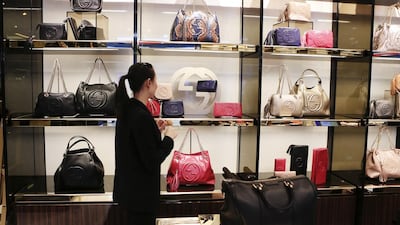Wearing a Rolex watch or a Prada handbag may not necessarily make you a better person, but it might indeed polish your perceived image in a society where brands define individuals and indicate their economic status.
While this explains why those who can afford buying luxurious brands spend large amounts of money on unneeded accessories, it can also explain why those who cannot afford such products feel the need to own fake or counterfeit goods – even though it’s an illicit trade.
In an effort to tackle the issue, local police have clamped down on fake goods, arresting counterfeiters and seizing tens of thousands of replica goods. This year, fake watches and clothes worth Dh34 million were seized by Dubai police during the month of Ramadan alone. This is the period when the trade reaches its peak, according to Maj Gen Khalil Ibrahim Al Mansouri, director of the Criminal Investigation Department at Dubai Police.
While tough punishment might help to stop some counterfeiters, it has been argued that this is not the best technique to halt what is a multimillion dirham market. As long as there is demand, the counterfeiters are going to carry on their business regardless of what the laws say.
The question here is how to tackle demand or, in other words, how to convince people that it is actually a bad idea to buy fake products?
To do this we need to understand what really goes on inside the minds of people when they buy a fake watch or a “first copy” purse, both consciously and subconsciously. And as the police crack down on the trade mainly for economic or copyright reasons, are there any negative consequences of such a trend on individuals themselves or on the society as a whole?
Of course some buyers of counterfeit goods do so innocently because they believe they are buying the real deal. But most buyers are fully aware of the fact that those products are fake and are complicit in their illicit trade. The obvious reason for this would be the much lower price but a deeper explanation would be their psychological impact on individuals.
From a psychological perspective, it's important to understand the critical role that self-esteem plays in driving this phenomenon. Research by the UK-based Association for Consumer Research found that consumers of counterfeit products may see brands as bridging the gap between the actual and ideal self, or the image of themselves as they would like to be.
But does this really allow purchasers to have the ideal self-image they sought in buying such goods?
The study found that people – who knew the goods were fake – seemed to believe that this was contributing to their self image and that the “bridging effect” of a brand survives, especially if the deception could not be known by other people. However, those people still felt deep down like liars or frauds when they wore them in public.
This means that despite the temporary positive feeling that counterfeit goods give to consumers, their influence can be deeply deceptive. What those consumers are probably not aware of is that this can lead to unexpected negative influences that appear to be unconscious.
A different study by the journal Psychological Science looked into the possible consequences of buying and using counterfeit products and found that wearing such products can actually make individuals feel less authentic when they go out in public. The chance that they behave dishonestly and judge other people as unethical increases the more they use such goods.
This could happen to them without realising the possible cause of their judgmental and cynical attitude. And so they continue to buy and use fake products thinking that their benefits outweigh the costs.
Another study at Duke University took it a step further and looked at the behavioural consequences of consuming such goods, suggesting that it can affect people’s moral compass. So when they start being dishonest and pretend that they own the real thing, it becomes easier for them to be dishonest in other circumstances as well.
While it is difficult to convince people to stop buying such products, it is possible to reduce demand through awareness campaigns, focusing on the hidden consequences of using counterfeit goods on individuals, society and economy. People need to understand that buying fake goods will not give them mental satisfaction in the long-run nor really give them the social status they seek.
Unless people are more aware that they are engaging in unethical behaviour and are participating in a crime and willingly take a stance against it, the demand for counterfeit goods will continue and the market will thrive even further.
Our real battle isn’t only against counterfeiters, but rather against the minds of consumers.
aalmazrouei@thenational.ae
On Twitter: @AyeshaAlmazroui

